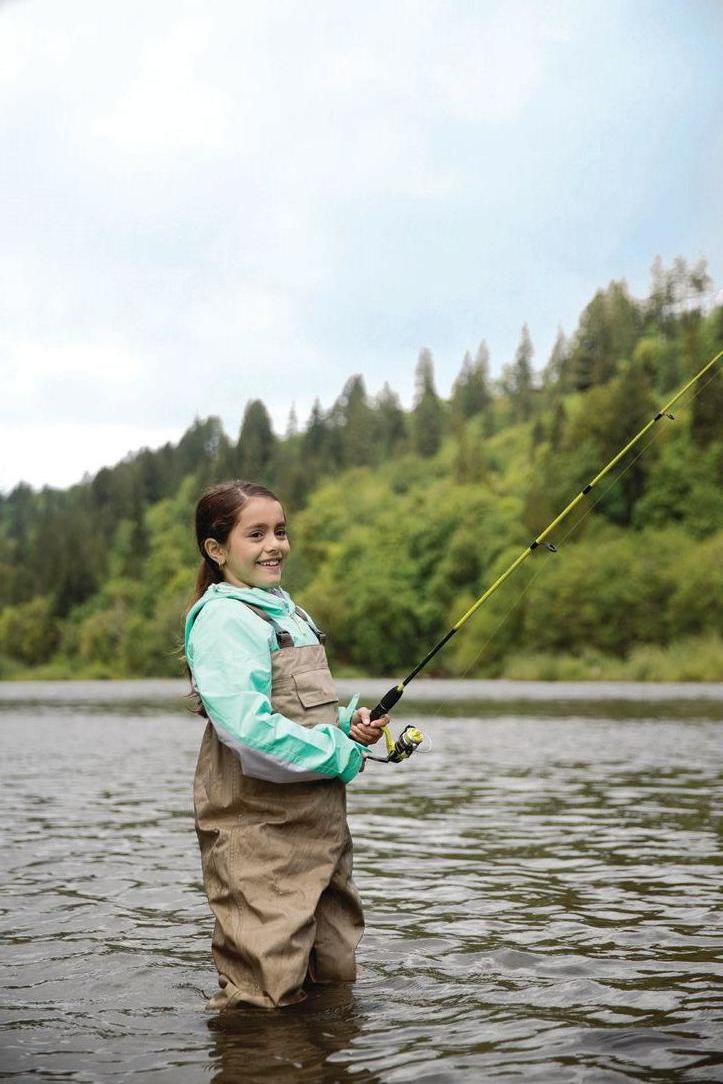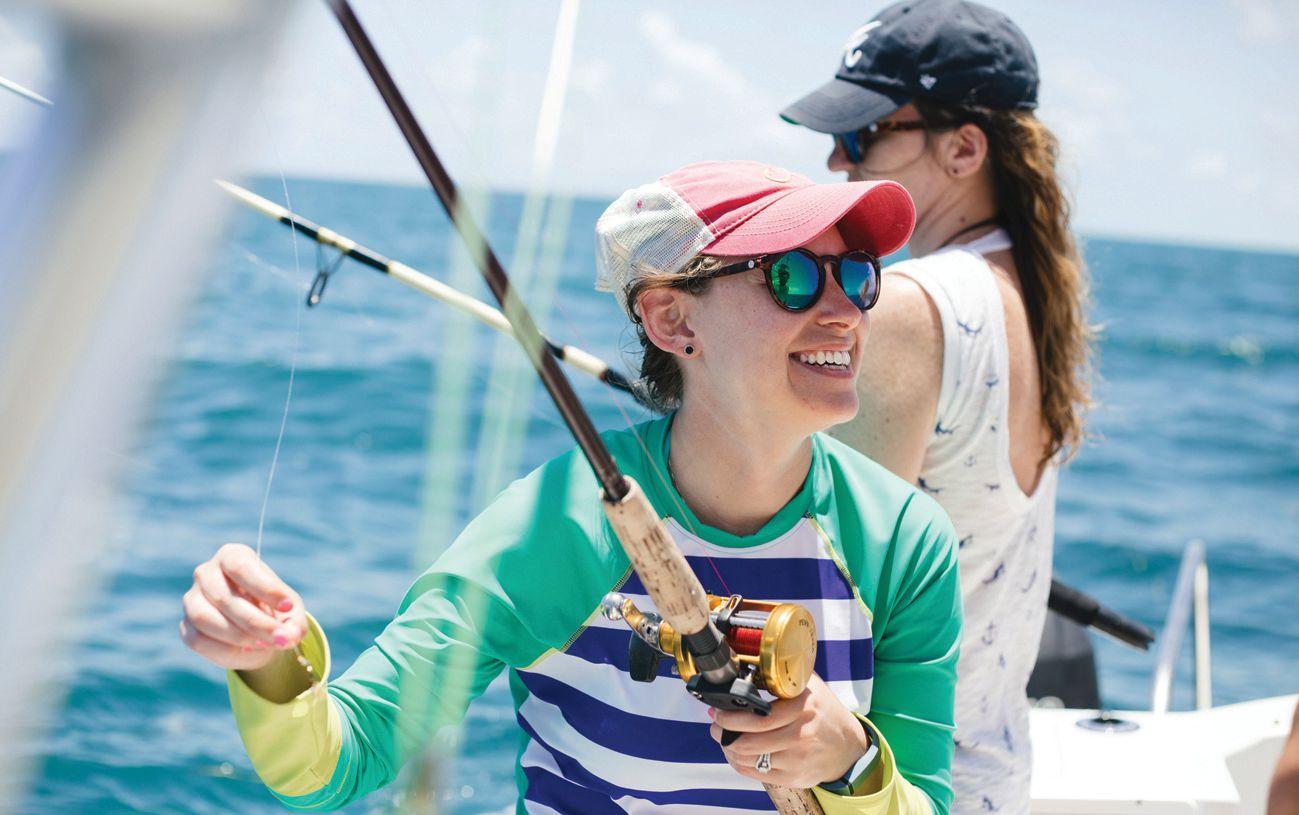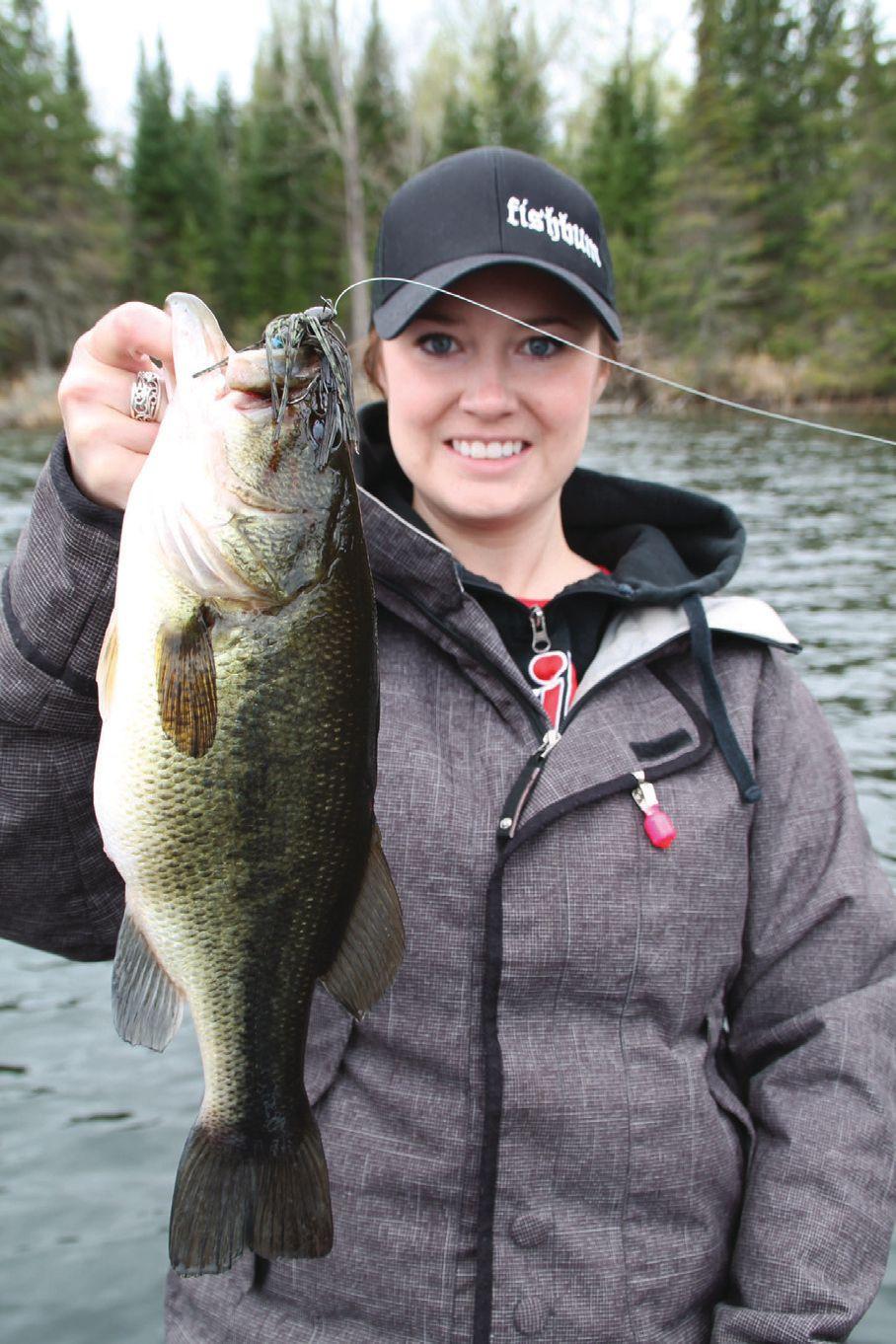
8 minute read
Women on the Water
The RBFF recently announced “Making Waves,” an initiative to empower women and girls “to cast off labels and rock the boat—with a fishing pole in hand.” Statistics show that women helped drive an 8.2% spike in fishing participation over the past five years and 45% of new anglers are female. RBFF also learned that, surprisingly, moms are taking kids fishing more than dads. But other statistics showed that women were not returning to the sport. One woman in five felt that they didn’t belong, stated Stephanie Vatalaro of RBFF. “They obviously were interested and trying fishing at a higher rate, but we needed to do something to get them excited about being an angler—getting their fish on!” she replied. The RBFF is now dedicating efforts via public relations and events with media, retailers and manufacturers to improve the industry’s approach to women.
“Making Waves” joins RBFF’s multicultural and family outreach programs “Take Me Fishing” and “Vamos a Pescar,” which aim to increase participation in fishing and boating while preserving and conserving natural aquatic resources. However, such outreach is not new. Ask Betty Bowman of “Ladies Let’s Go Fishing” and Judy Rhodes of “DIVA WOW,” founded in 1997 and 1999 respectively, and they will tell decades of stories of pioneering women in the outdoors.
Betty Bowman worked in marketing for Wellcraft when there were few women in the industry. She learned to fish and boat by watching her co-workers, building her own body of skills, learning to understand what they were doing and why. While attending an ICAST fishing trade show, she heard a speaker say that the boating and fishing industry wasn’t picking the low-laying fruit—women. She realized that most women didn’t have exposure or the opportunity to go fishing and she wanted to create a program to help women experience the sport. The Florida Fish & Wildlife Commission backed her and Bowman put together programs, an office, and now, over 20 years later, has 5,000 graduates.
“Ladies Let’s Go Fishing” seminars teach the “No Yelling” method of learning equipment, vernacular and, most importantly, the “whys” of fishing. “Women want to learn things before they get out on the water and get yelled at,” says Bowman. “They are hands-on and want to know ‘why’ things are done and how. Once they feel confident to get on the water and learn to fish, they feel comfortable getting out on a boat.”
Bowman and her team teach land-based seminars, then rely on fishing guides to get women out on boats to fish. That service is paid separately from the seminars, but it is the real take-away for women, some taking it seriously and becoming competitive anglers.
Sponsors like RBFF, Mercury, Power Pole and others have helped with gear and financial backing. “The boat ramp can be a very intimidating place,” says Bowman. So, launching a boat from a provided Magic Tilt Trailer has been an important part of her clinics.
Most classes are on saltwater fishing, but Bowman does some fresh water programs and has added adventure trips to Cuba and tournaments in the Florida Keys to keep women coming back for

more.

“We’ve learned a lot about this market because we’ve
surveyed women,” she says. “We’ve seen the numbers grow because when one woman goes fishing, she brings her whole
RBFF's Oregon Day helps young girls feel the power of fresh water fishing. Photo courtesy of RBFF.
social circle,” Bowman states. “Women just want to feel comfortable walking into a tackle shop and asking questions. I wish I had been able to take this course!” she adds.
Judy Rhodes was a Texas rancher’s daughter, so she grew up roping cows, riding horses, and hunting with her father and brothers. Her husband was equally supportive of her passion to get other women into the outdoors as Rhodes set out on an educational mission, creating DIVA WOW, (Women Outdoors Worldwide). “When my sons graduated high school, I closed the kitchen and vowed that no woman was going to be left behind in enjoying the outdoors,” she says.
Rhodes began with shooting sports then segued into fishing and has even added equestrian and dog training to DIVA WOW’s repertoire. She serves women from 9 to 92 years of age and teaches the joy of the outdoors in a “womenfriendly” environment where they become “friends and sisters.”
“Women are eager to participate—we like to have fun!” Rhodes says. She now has 53 million followers and 150-650 women participating in various educational programs because of traditional and social media and word of mouth. Those members in 50 states and 21 foreign countries help DIVA WOW with R&D as they network with women worldwide about the outdoors.
“Women talk—we want to know everything, and we tell each other about what we’re doing. Women want to share fun,” she says. She also notes, “Women like to do it right and look good doing it. We need clothes that fit a woman’s body—we want the fashion—the boots, the glasses,” which has opened the door for sponsors to jump on the bandwagon, support the effort with money and product and take advantage of the growing women’s market.
Companies like Simms Fishing Products and Temple Fly Outfitters (TFO) are providing equipment and putting on events with their retailers. After participating in a DIVA WOW event, Kimberly Penick, customer service rep for TFO said she wanted to share her knowledge of fly fishing and was welcomed (with a “Hell yeah!” from Judy Rhodes) into the volunteer instructor network.
Having fished with her grandfather and father for years, Penick has an innate sense of the outdoors and is passionate about sharing it with men, women and young people. She credits women like Rhodes for the growth in outdoor sports. “This was a man’s world and now fewer women are intimidated. It is important to learn the fundamentals and that protective equipment is important—having the right clothing, glasses, waders, and rod and reel for the right species,” she says. She also notes that TFO is very supportive in providing equipment to non-profits to help the growth effort. She encourages women to go to their local retailers to take lessons and join local fishing clubs. “Life is better outside!” she states. Simms has a 10-year track record with an event called “Chica de Mayo,” done with River’s Edge, an outfitter with two locations in Bozeman, Montana. The annual celebration, which includes instruction, cocktails, networking, and auctions, grew from 60 to 300 women and this year, raised $5,000 for Casting for Recovery, a non-profit that uses fly fishing as therapy for breast cancer survivors.
Building on that success, Simms is rolling out a national event called “Women Are Fly,” with a support template and materials for its 550 retailers in the U.S. and Canada to
utilize in hosting their own events. Says Diane Bristol, senior director of Employee and Community Engagement, “We want to help women learn about the sport and feel comfortable in fly shops. Fishing isn’t gender specific. Women get families out to fish and they bring friends. More women are getting into it and sticking with it. This is a public issue—it supports conservation and it is really taking hold. The more people we get into the sport, the more they understand the importance of clean water and healthy fishing,” she adds.
Social media has fueled additional growth in women’s participation in

Girls take on salt water angling, proving the RBFF motto: “I’m not afraid to make waves!” Photo courtesy of RBFF.

Amanda Buer is Instagram-ready with her catch and RBFF ad line, “I don’t wait for respect, I reel it in!” Photo courtesy of RBFF.
fishing, as evidenced by a Facebook and Twitter feed from “Girls Kickin’ Bass.” Retired Ohio State Troopers Dianna White and Lisa Taylor had fished together for years and decided to get a boat to enter tournaments. They started the social media accounts to talk about fishing, develop a presence, and encourage more women and girls to get out and fish. They compare fishing to motorcycling, another sport they enjoy and where they see women’s participation growing. “Women are becoming empowered to do new and non-traditional things,” says White, “We have been the only women in the tournaments we enter, but we’ve received a warm welcome from the guys—they even ask us for fishing tips!”
These fishing females want to share their passion and often take groups of friends out on their pontoon boat to try the sport—and they see the enthusiasm growing. “There’s nothing I’d rather do!” states Taylor, who hopes to also teach fishing at Ohio University, where she currently teaches law enforcement.
RBFF entrusted its newest program, “First Catch Centers,” to Shane Wilson, a long-time educator and founder of “Fishing’s Future,” a non-profit that educates and brings families together around fishing. Wilson, a passionate fisherman and elementary school teacher says, “Education is the future of fishing.” A staunch Midwesterner with strong family ties, Wilson witnessed the lack of time families spend together and the number of single mothers who need activities to share with their children. He
created a five-level curriculum that includes water safety/rules and regulations; tackle box basics; equipment; knots; casting; and preparing for fish. Groups of parents and children rotate through 20-minute segments, learning the basics with different instructors. At the end, each child is encouraged to hug his or her parent and say, “I love you!” For both, the experience can be life altering. “We use fishing as a way to get families together,” says Wilson. “The parents see the joy in their kids’ faces, everyone learns skills and they find something to share.”
The volunteer Fishing’s Futures organization has 80 chapters in 21 states, so the new RBFF First Catch Centers in Texas and Pennsylvania are a natural extension of Wilson’s original program. This two-year pilot program is an effort to combine the fragments of local programs with retailers and government departments like the U.S. Fish & Wildlife Service, to provide equipment, create youth programs, and host events to bring families together to learn about fishing. By growing participation, RBFF sees the industry’s growth and continued efforts to support conservation and diversity in outdoor sports. “We are fishing’s future,” states Wilson, “This is the right time and fishing is the gateway to the outdoors.”
To learn more, visit: www.rbff.org, www.takemefishing.org/makingwaves, http://news.takemefishing.org/first-catch-centers, www.fishingsfuture.org, www. ladiesletsgofishing.com, www.DIVAWOW.org, www.facebook.com/GirlsKickinBass/ team.









